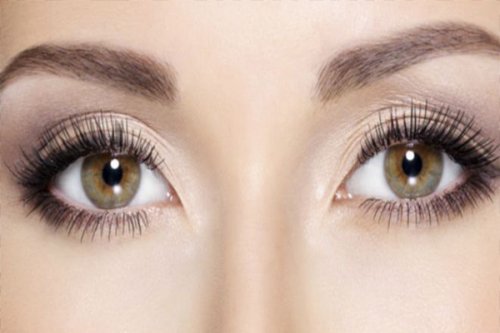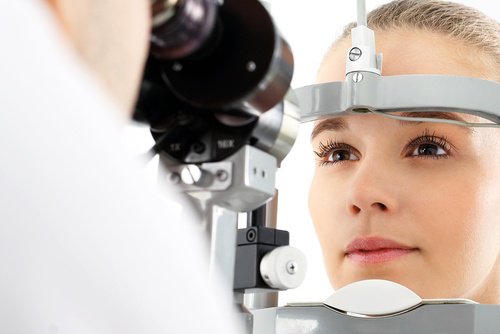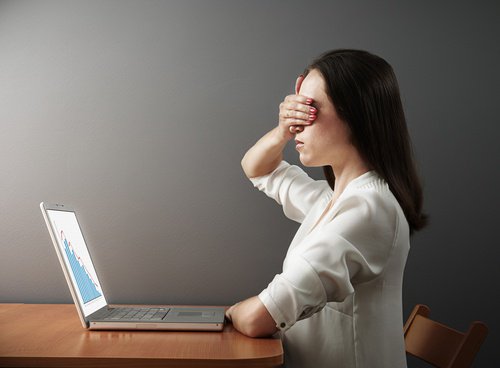6 Tips to Keep Your Eyes Healthy

Your vision is one of your most prized senses, but many people don’t care for it as they should. You’ve probably heard on numerous occasions how to care for your body and each of its systems. But how much do you think about how to keep your eyes healthy?
Most tips for caring for your vision are along the lines of “Don’t watch too much TV” or “Don’t use your computer and your cell phone.” These tips have become somewhat obsolete, however.
Although they’re still pretty useful, the reality is that most of us spend several hours a day in front of a computer screen for work, school, or other activities.
That’s why today we want to talk about some tips for keeping your eyes healthy.
1. Improve your diet to keep your eyes healthy

One of the best foods you can choose when caring for the eyes are carrots, which are rich in vitamins A and C. These are responsible for maintaining and improving the health of your eyes.
That’s not the only way that food affects your eyes, however. If you have a poor diet, it increases your risk of suffering from diseases like glaucoma.
You may also like:
The surprising power of carrots
2. Wear sunglasses as much as you can
Sunglasses aren’t just for being fashionable. They also help reduce the impact of UV rays on your eyes. If you’re going outside, you should wear sunglasses no whether it’s cloudy or not.
When shopping for sunglasses, make sure that they block at least 90% of the UV rays.
Also, it’s even better if they’re polarized. This will keep your eyes healthy and feel more comfortable when you’re in a sunny place.
3. Talk to a specialist about your vision

For those of you who don’t know, an eye exam consists of the following:
- Viewing images through different lenses
- Reading letters that vary in size
- An examination of the eye using a painless device to check your eye pressure
This is the full procedure, so don’t be afraid to have it done.
If you want to ensure you get the best results from your eye exam, you should also have your pupils dilated.
This test will apply a few drops to make your pupil dilate more than normal so that the doctor can examine your eye more thoroughly. Most of the time, it’s used to rule out any severe problems when your intra-ocular pressure.
4. If you already wear glasses, take care of them!
Wearing glasses doesn’t necessarily mean that you don’t have healthy eyes. In most cases, you only need extra help to be able to see better or prevent wear on the vision.
It doesn’t matter if you wear glasses or contact lenses. You should always keep them clean. This will help avoid putting a strain on your vision and also keep you from getting possible infections.
It’s a good idea that you have a general checkup once a year to check the state of your vision and adjust your lenses if needed.
5. Learn how to use computer screens

It’s nearly impossible to live without a computer or smartphone screen.
That doesn’t mean that there aren’t ways to protect your vision when you use them, however. The key is in moderation.
When you watch television, the distance you should keep from your screen is three feet. If you’re going to use a computer, there should at least be two feet between your eyes and the screen.
It’s common to use cell phones in the dark, but you should know that this is harmful to your vision. It’s best to always use screens with the lights on.
In addition to the above, remember that most screens have the option to adjust the brightness. Use this setting to relax your vision.
We recommend you also read:
6. Wet eyes mean healthy eyes
Eyes need to be constantly moisturized, and so if yours feel dry or itchy, your vision will suffer.
If blinking isn’t enough, ask your eye doctor to recommend some artificial tears for occasional maintenance.
If you spend several hours in front of the computer a day, apply one drop in each eye every three hours, or whenever you experience any discomfort. This will help your eyes stay healthier for longer.
As you can see, all of these tips to keep your eyes in good condition are very easy to follow. Just take care of them like any other part of your body. Follow these tips to have healthier eyes.
All cited sources were thoroughly reviewed by our team to ensure their quality, reliability, currency, and validity. The bibliography of this article was considered reliable and of academic or scientific accuracy.
- Rasmussen HM, Johnson EJ. Nutrients for the aging eye. Clin Interv Aging. 2013;8:741–748. doi:10.2147/CIA.S45399
- van Kuijk FJ. Effects of ultraviolet light on the eye: role of protective glasses. Environ Health Perspect. 1991;96:177–184. doi:10.1289/ehp.9196177
- Moshirfar M, Pierson K, Hanamaikai K, Santiago-Caban L, Muthappan V, Passi SF. Artificial tears potpourri: a literature review. Clin Ophthalmol. 2014;8:1419–1433. Published 2014 Jul 31. doi:10.2147/OPTH.S65263
- Al Owaifeer, A. M., & Al Taisan, A. A. (2018). The Role of Diet in Glaucoma: A Review of the Current Evidence. Ophthalmology and therapy, 7(1), 19–31. https://doi.org/10.1007/s40123-018-0120-3
- Kierstan Boyd. 2020. Computers, Digital Devices and Eye Strain. American Academy of Ophtalmology. https://www.aao.org/eye-health/tips-prevention/computer-usage
This text is provided for informational purposes only and does not replace consultation with a professional. If in doubt, consult your specialist.








